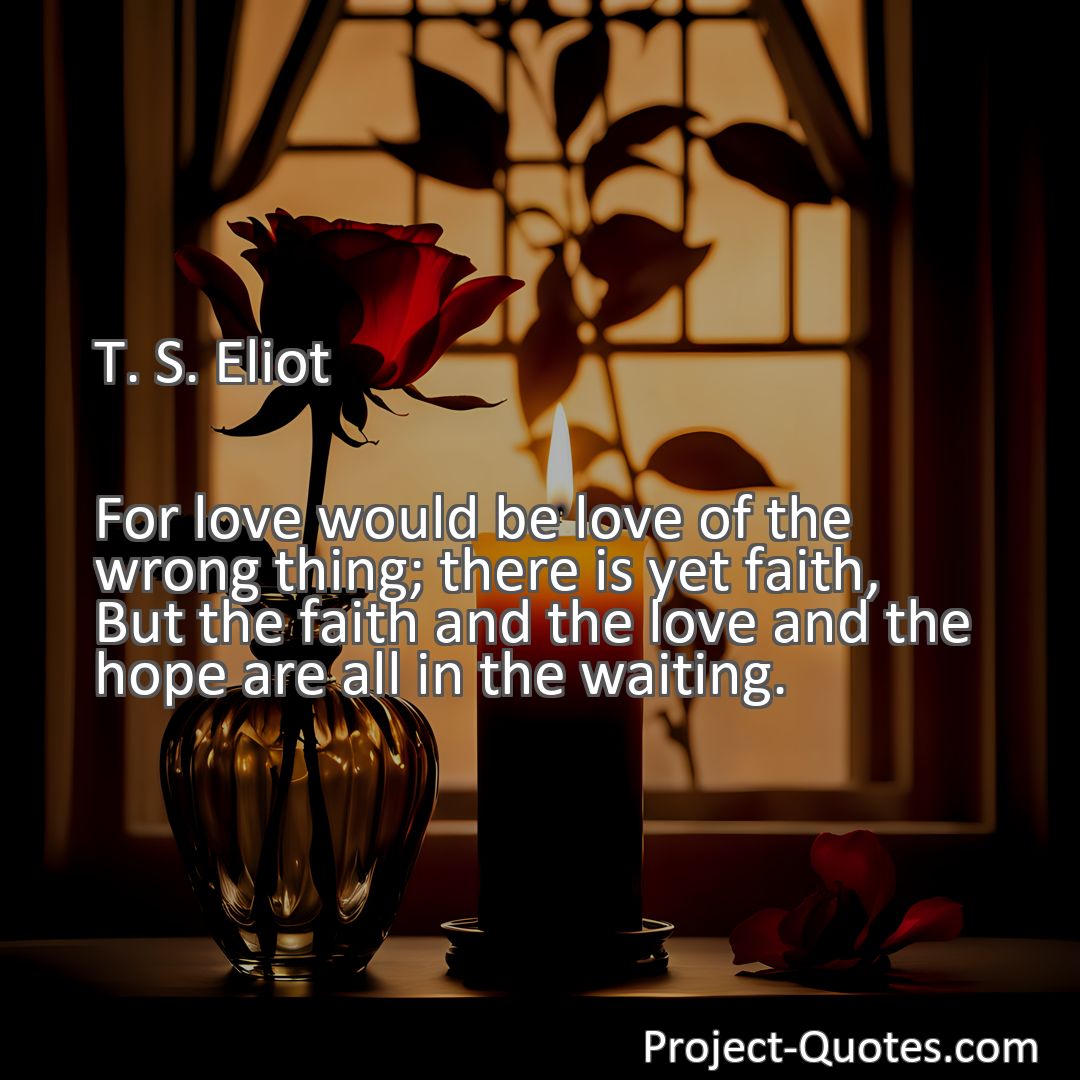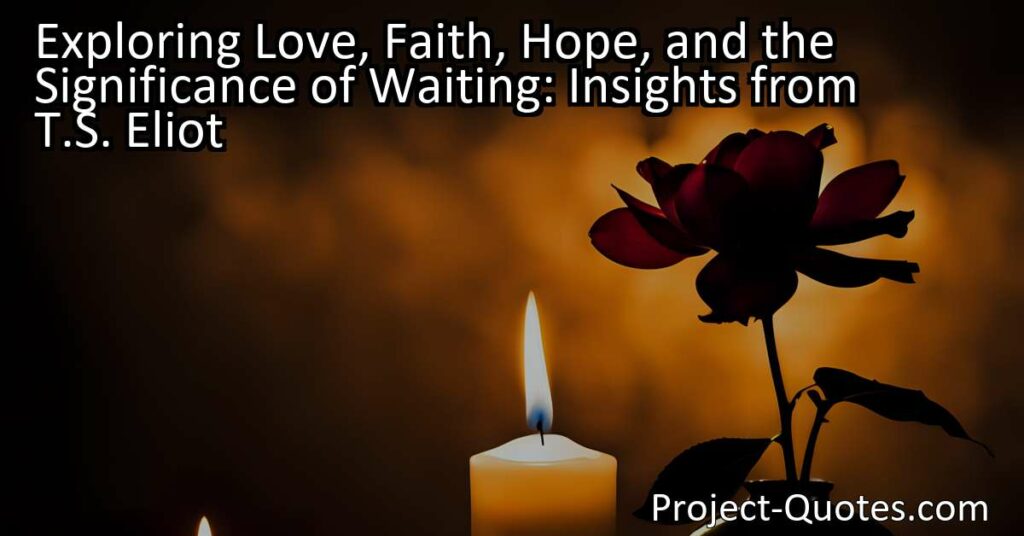For love would be love of the wrong thing; there is yet faith, But the faith and the love and the hope are all in the waiting.
T. S. Eliot
In this exploration of love, faith, hope, and the significance of waiting, T.S. Eliot’s quote serves as a profound truth that can be expanded upon. It delves into the idea that love can sometimes be directed towards the wrong thing and the importance of discernment. It also emphasizes the role of faith in times of waiting and the intertwined nature of hope and faith. Ultimately, this exploration highlights the value and transformative nature of waiting in our lives.
Table of Contents
- 1 For love would be love of the wrong thing; there is yet faith, But the faith and the love and the hope are all in the waiting.
- 2 T. S. Eliot
- 3 Meaning of Quote – For love would be love of the wrong thing; there is yet faith, But the faith and the love and the hope are all in the waiting.
- 4 Freely Shareable Quote Image
- 5 Related
Meaning of Quote – For love would be love of the wrong thing; there is yet faith, But the faith and the love and the hope are all in the waiting.
In life, we often find ourselves waiting for something or someone. It could be waiting for a loved one to return, waiting for an opportunity to arise, or simply waiting for our dreams to come true. Waiting is not always easy, but there is a certain beauty and significance in the process. As T.S. Eliot once said, “For love would be love of the wrong thing; there is yet faith, But the faith and the love and the hope are all in the waiting.” This quote holds a profound truth that can be analyzed and expanded upon, exploring the notions of love, faith, hope, and the significance of waiting.
Love is a powerful force that can bring immense joy and fulfillment to our lives. However, Eliot suggests that love can also be misplaced or directed towards the wrong thing. This idea emphasizes the importance of discernment and understanding what truly deserves our love and affection. It is easy to get caught up in superficial desires or temporary infatuations, but true love requires a deeper connection and genuine understanding.
When we place our love in the wrong thing, we may experience disappointment and heartbreak. This can lead to a loss of faith in ourselves, in others, or even in the concept of love itself. Yet, as Eliot reminds us, faith still exists even when love is misguided. Faith is the unwavering belief that better things are yet to come. It is the confidence that despite past failures or letdowns, there is still a reason to hope and to continue waiting for something greater.
Hope is closely intertwined with faith and love. It is the fuel that keeps us going during times of uncertainty and waiting. It is the belief that there is a purpose behind our waiting, that the future holds something meaningful and fulfilling. Without hope, waiting can feel like an endless and pointless endeavor. However, with hope as our guide, we find solace in the waiting, knowing that it is leading us towards something worthwhile.
The act of waiting is often seen as inconvenient and frustrating in our fast-paced world. Instant gratification has become the norm, and patience is becoming a scarce virtue. However, Eliot’s quote reminds us of the importance of waiting. It suggests that the process of waiting holds immense value, that it is not just a means to an end but an integral part of the journey.
In the context of love, waiting allows us to truly understand the depth of our feelings. It gives us the opportunity to reflect on what we truly desire and determine whether our love is genuine and sustainable. Waiting also tests our patience and resilience, teaching us the value of delayed gratification and the rewards that come with it. It forces us to grow and mature as individuals, preparing us for the love and relationships that lie ahead.
Faith plays a crucial role in the waiting process. When we are waiting for something or someone, it is easy to lose sight of our ultimate goal. Doubts and uncertainties may creep in, making us question whether our waiting is in vain. However, faith reminds us to persevere, to hold on to our beliefs and convictions even when the outcome is unclear. It provides us with the strength and motivation to keep waiting, knowing that our faith will eventually be rewarded.
The waiting period can also be a time of self-discovery. It allows us to explore our own desires, goals, and values. During this time, we may discover new passions or rediscover forgotten dreams. We have the opportunity to grow as individuals, to develop new skills and strengths that will serve us well in the future. Waiting can be a transformative experience that shapes us into the best version of ourselves.
Moreover, the waiting period can be a test of our resilience and ability to endure. It teaches us the value of patience and perseverance. In a world where instant gratification is encouraged, waiting challenges us to resist the urge for immediate results and to trust in the process. It reminds us that good things come to those who wait and that our patience will ultimately be rewarded.
In conclusion, T.S. Eliot’s quote reminds us of the profound nature of waiting. It teaches us that love can sometimes be misplaced, yet faith still exists. It emphasizes the significance of hope and how it guides us during times of waiting. Waiting, though often seen as inconvenient, holds immense value in our lives. It allows us to reflect deeply on our desires, develop patience and resilience, and grow as individuals. So, while waiting may be challenging, it is through this process that we find clarity, purpose, and the fulfillment of our hopes and dreams.
I hope this quote inspired image brings you hope and peace. Share it with someone who needs it today!


